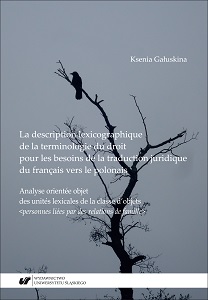La description lexicographique de la terminologie du droit pour les besoins de la traduction juridique du français vers le polonais
Lexicographical description of legal terminology for the purpose of legal translation from French into Polish Object oriented analysis of lexical units belonging to the class of objects <persons in family relations>
Author(s): Ksienia Gałuskina
Subject(s): Language and Literature Studies, Law, Constitution, Jurisprudence, Applied Linguistics, Translation Studies, Sociology of Law
Published by: Wydawnictwo Uniwersytetu Śląskiego
Keywords: legal terminology; legal translation
Summary/Abstract: The subject of this monograph is lexicographic description of the terminology of law, with special emphasis on its use in the translator’s work environment, precisely in the context of machine and computer-aided translation. This description is based on the model developed by W. Banyś in the context of object-oriented description of lexical units. This work constitutes an application of this model to the lexical description of legal lexical units belonging to the analysed class of objects <persons in family relations>. The monograph consists of two parts. The first is descriptive, and it aims to provide a disciplinary and theoretical framework for this work. The first chapter discusses briefly the notions of legal language, legal text and legal translation. It explains distinction between different types of machine translation (rule-based, statistical, hybrid, neuronal) and computer-aided translation. Two fundamental approaches to description of terminology are presented: prescriptive and descriptive, and the emphasis is put on the importance of using linguistic corpora in terminological research. The second chapter presents an object-oriented description. A detailed discussion of the object-oriented description of lexical units by W. Banyś is accompanied by the outline of the following theoretical concepts: the object classes by G. Gross, the theory of Sens-Texte, the generative lexicon theory and the WordNet ontology, including, where possible, their suitability for the description of specialized lexis in the field of law. The third chapter discusses issues related to the object-oriented description of the specialized vocabulary, with particular focus on the selection process and the final choice of lexical units for the analysis, as well as the selection and exploration of corpora. The model of object-oriented description of lexical units is descriptive and its purpose is to present the language of law in its authentic form. The second part of the work is practical. It presents the lexicographic description of lexical units selected for the analysis, conducted in accordance with the methodology outlined in part one. It consists of the tables containing a description of fifty-two lexical units belonging to the object class <persons in family relations> and one lexical unit belonging to the superclasses: <persons> and <subjects of law>. These tables illustrate the use of W. Banyś’s lexicographic model to describe the units of the language of law.
Series: Językoznawstwo
- E-ISBN-13: 978-83-226-3547-6
- Print-ISBN-13: 978-83-226-3546-9
- Page Count: 342
- Publication Year: 2019
- Language: English, French, Polish
- eBook-PDF
- Table of Content
- Introduction

